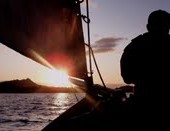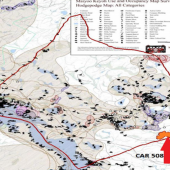Reynolds (2004) says we write from where we are (p. 53). What does that mean? In a class called Composing our City, place, place-based learning, and place-based projects were the sustainable modus operandi. We wrote, thought, and created where we are from. As we engaged in place-based learning, we touched on topics like the emotions places evoke, how environments come with a sense of place, learning the art of flaneurism, and how crossing borders in our assignments teaches us aspects about our environments and ourselves we could not learn otherwise. Flaneurism was our method of collecting data and the object of our writing, as we explored, described, and discovered where we are from.
Continue Reading
What began more than thirty years ago as a personal journey to explore my Scandinavian roots has evolved to a deep understanding of my mythopoetic connections with nature that has transformed my teaching. Through the process of exploring, learning, teaching and living in Norway, I have developed a field course for upper division students at Prescott College. From learning to sail traditional wooden boats to assisting with a harvest at a thousand year old farm, students discover the meaning of sustainability thr
ough direct experience, and how people have survived in a landscape that has directly influenced the Scandinavian cultural movements of Deep Ecology, and Friluftsliv or “Free Air Life”. The sharing of cultural wisdom handed down through generations of how to live sustainably with a landscape is rapidly disappearing and is key to our survival.

Effective bases of environmental decision-making build upon multiple and divergent understandings of landscapes and landscape connection. This paper develops ‘ethnogeomorphology’ as a tool for developing a shared (if contested) landscape platform for sharing worldviews and perspectives. Interfaces of intercultural communication, particularly with many Indigenous knowledges, are spaces of crucial juncture in understanding challenges of environmental and social sustainability and their relevance extends far beyond only ‘Indigenous studies’. Methodologies that aim to empower many Indigenous communities in documenting their knowledges can fail when attempting to communicate them in terms of conventional cause-and-effect science based on assumptions of linear and static spatial perspectives. This paper documents one such failure in practice with the Maiyoo Keyoh in Canada, and draws upon research conducted with the Yorta Yorta Nation (south-eastern Australia), the Stò:lō Nation (British Columbia, Canada), the Maiyoo Keyoh (northern British Columbia) and the Tia Kina Te Taiao (in New Zealand), from 2007-2011. Emerging insights in geography offer critical insight in addressing some of these challenges in practical ways, as increasing unrest in ‘physical’ disciplines (such as geomorphology), contest traditional binaries between ‘physical’ and ‘human’. This paper argues that geomorphic landscapes themselves are good learning tools that illustrate dynamic time-spaces. Recent developments around concepts of emergence, contingency and complexity, addressed through system-specific applications, point to reengagement with ‘place’. Similarly, conceptual developments in human geography see concepts of “scale as relation” rather than ‘scale as level’, also offers synergistic perspectives with physical geography founded on seeing multiple scales simultaneously. This solid grounding of coherence in geography could contribute to a practical and grounded basis of sustainability. Rather than being limited to theoretical debates, this paper illustrates the potential of a hybrid geography in practice. This convergence/hybridity in perspectives is not a conflation of knowledges, but an opportunity for situating worldviews in dialogue, assisting efforts to decolonize intercultural communication and promote ethical engagement in practice. This ‘ethnogeomorphic’ perspective offers a reconsideration of the term ‘adaptive’ in ‘adaptive management’, framed around multiple connections to landscapes, rather than as a tool restricted to Western science.
Continue Reading